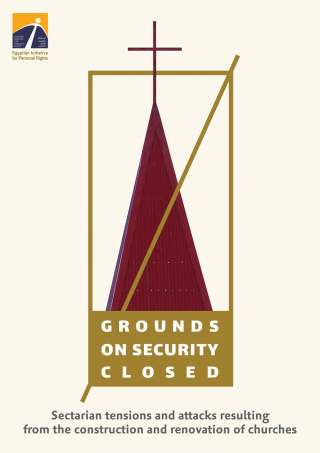The lawyer with the Egyptian Initiative for Personal Rights filed suit before the Administrative Court against the interior minister and the director of the Travel and Immigration Department, both in their official capacity. The suit is seeking an expedited stay on the passive decision of the Interior Ministry’s Travel and Immigration Department to refuse to permit Ahmed Harqan to travel abroad
Files: Freedom of Religion and Belief
The Egyptian Initiative for Personal Rights said that three years after its adoption, the church construction law has failed to end violations of Christians’ right to worship and address related sectarian tensions. It criticized the security apparatus for shutting down church buildings and thereby prohibiting many Copts in Egyptian villages from engaging in collective worship.
EIPR condemns closure of the Naga al-Ghafir church in Sohag by security and documents closure of 22 churches since enactment of the church construction law; demands reopening of closed churches and a decree regularizing the status of all churches that filed papers with the regularization committee
What happened in Dimshaw Hashim is not a unique case, but a recurrent pattern in a number of governorates that has been going on recently, manifested in closing a number of existing churches and them being unable to settle their legal status.
The EIPR found that from September 28, 2016, when the church construction law was issued, to April 2018, state institutions have shuttered 14 existing churches that were hosting religious services prior to the closure orders. Four of these churches were closed this year, with Copts denied access to them and prayer services in them prohibited.
A year after the displacement, the security situation remains unstable and Christians are not afforded a minimum level of protection. The displaced families are therefore unable to return to Arish, and in some cases people who decided to return were targeted and killed by masked men.
The Egyptian Initiative for Personal Rights is deeply concerned about the judgment issued yesterday by the Atfih Misdemeanor Court in the Giza governorate in case no.
Introduction
On September 28, 2016, Law 80/2016 was adopted to regulate the construction and renovation of churches and their annexes. State officials, parliamentarians, and some sectors of the Christian ecclesiastical leadership heralded the new law as a solution to the long-standing difficulties of building or renovating churches.
The study includes an analytical section and two annexes. The analysis reviews statutes regulating church construction, significant court rulings of relevance, and their impact on the legal status of existing churches and various official licenses. The study then looks at the types and frequency of sectarian attacks linked with the exercise of the right of worship, offering a quantitative analysis of the 74 sectarian attacks seen in Egypt from January 25, 2011 to August 2016. It describes the flashpoints of tension, the profile of attacks and their relationship to political parties or governing forces, and whether patterns changed in tandem with changes in regime.
The study includes an analytical section and two annexes. The analysis reviews statutes regulating church construction, significant court rulings of relevance, and their impact on the legal status of existing churches and various official licenses. The study then looks at the types and frequency of sectarian attacks linked with the exercise of the right of worship, offering a quantitative analysis of the 74 sectarian attacks seen in Egypt from January 25, 2011 to August 2016.





